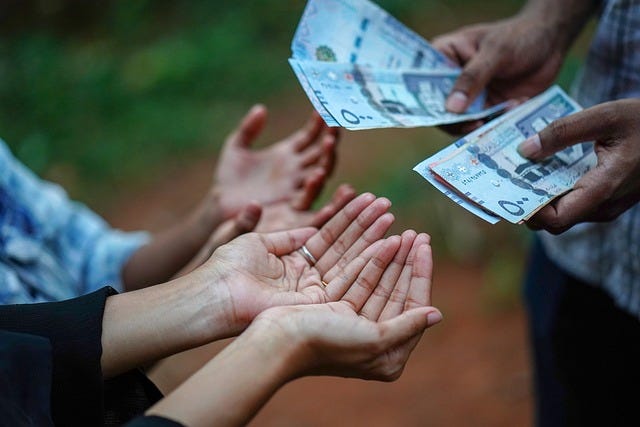If my brother needed one of my kidneys, I’d donate it to him without a second thought…But if he asked to borrow a hundred dollars, I’d have to think about it.
No, this isn’t really about my brother, at least not the hundred dollars. Yes, he gets a kidney any time he needs it.
This is about the value we place, and who and what we place it on.
I generally don’t donate to panhandlers. Lord knows they need it, and I can spare a few bucks. But what would they do with the money? Buy drugs? Part of me feels that encouraging begging promotes something that I don’t really support. Would my donation enhance their life, or diminish it? I can’t really know, because I don’t know them. Yes, I should get to know them, but there’s just so many hours in a day. TIME! Not just money, but how much time am I willing to give away?
I ask myself; would I give that panhandler a kidney? Not out of the question. He might get my kidney before he gets my cash. But how much of my time will I give him?
Perhaps we’ve become too accustomed to valuing everything in dollars. I’ve noticed that our courts make almost all of it about the money. If some car driver injures someone you love, the lawyers go for the money. They want a cash commission, they don’t want 30% of someone’s sincere apology. But don’t we value that apology? Here’s a thought experiment: If someone in your home breaks something you care about, perhaps an ash tray your kid made years ago in art class, do you desire a cash settlement, or a heartfelt apology? The ash tray has no cash value, but it means much to you in sentiment. You want the person who broke it to recognize that, and not demean its value by offering cash in lieu of a heartfelt apology.
Try going to court to get a court-ordered apology.
And that causes me to remember a TV show I saw once, where the camera crew shadowed police in their daily actions. A kid, maybe twelve years old, had spray painted graffiti on a minister’s car. The cops caught him and took him to his mom. Rather than make excuses for her son, she told the boy how upset she was with him. The cops summoned the minister and explained the situation. If he wanted to file charges, they would take the boy to the juvenile center to be processed. The minister declined. He said, “If he’s at the juvenile center, he won’t be available to wash the walls of the meeting room on Saturday.” Turning to the boy, he continued, “You will be available on Saturday, right?”
What cash settlement has that much value?
We all used to be much more dependent on each other. Money wasn’t so much of a thing. Neighbors helped each other. Yes, we still do, but not necessarily to the same extent. We each go off to work, in different directions, earn a paycheck, and come home and watch TV. OK, it’s not that sparse, but neighbors are generally less dependent on each other than before. In previous times, people in a community lived and worked in that community. The baker lived above his bakery and so forth. People could live their daily life, day after day, without traveling farther than they could walk. People became responsible to each other in ways that couldn’t be measured in money. The Amish still live like that, and we have a sense that their lifestyle has value that our money cannot buy.
North Carolina has recently suffered terribly from Hurricane Helene. People needed help. They needed help more than they needed money. As FEMA diddled and claimed it didn’t have the funds, neighbors helped neighbors. While some FEMA employees declined to render aid to people with Trump signs in their yard, neighbors didn’t give a damn who you voted for. I’ve lived in a rural area. It’s a different world than the city. It’s an oversimplification, to be sure, but my experience is that, in the city, problems are solved with money. In the rural community, problems are solved with people. It all works much better in the rural community.
What is value? Can all value be measured in dollars? Of course not. A life well spent, might spend very few dollars. I wouldn’t be too quick to judge a person for being wealthy, for having so much money. Or for being poor. We all should measure ourselves and others, using more important criteria than money.
I have two kidneys. I could spare one, in a pinch.






I couldn't agree more. After hurricane Ian devastated our part of SW Florida in 2022, it was all about neighbor helping neighbor with chainsaws, tarps, food, water, etc.
I remember it as a time that did a lot to restore my faith in the basic goodness of people.